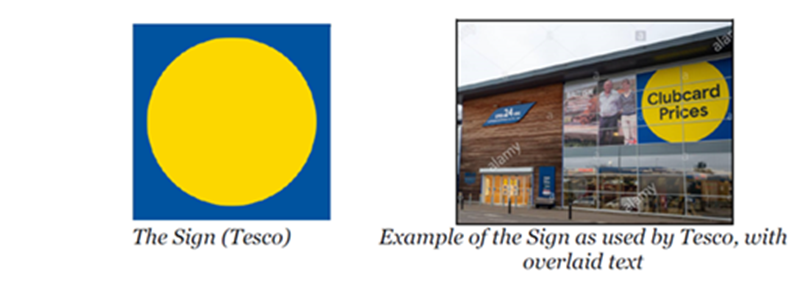n 2020, Tesco revealed a new logo to more effectively market and
promote its "Clubcards," or loyalty discount cards.
Afterward, since Tesco's new logo strongly resembles the plain logo of
Lidl, Lidl claimed that Tesco, the rival company, had violated their copyright
and trademark rights by using a sign that was highly similar to their logos as
well.
Lidl's logo has two versions: one with the word
"Lidl" (also known as "the
Mark with Text") and another without it (also known as "the Wordless Mark"). The Wordless
Mark is a graphical device consisting of a blue square background bearing a
yellow disk, bordered in a thin red line.
Meanwhile, Tesco’s new logo consisted of a yellow
circle within a blue rectangle, and 'Clubcard Prices' was written in black
letters in the middle.
The comparison of the two logos is as follows:


In the mentioned case, Lidl claimed that Tesco's use
of the new logo to promote 'Clubcard Prices' infringed Lidl's registered
trademark rights, constituted misleading advertising, and amounted to copyright
infringement. In response, Tesco counterclaimed with a bad faith allegation,
stating that Lidl filed the simple logo mark as a legal weapon, not intending
to use it but rather to create broader protection.
The Court of Appeal determined that consumers might
mistakenly perceive Tesco's prices as equal to or lower than Lidl's due to the
distinctiveness of Lidl's trademarks and its reputation for offering low
prices. Additionally, the Court of Appeal concluded that Tesco lacked a
compelling reason to persist with the signage and could have opted for
alternative methods to advertise its Clubcard prices.
Nevertheless, Tesco's claims that it had not replicated a significant
portion of Lidl's trademarks were accepted by the court. Tesco had previously
employed yellow circles and blue shading, and their signs differed from Lidl's
in terms of the distance between the shapes. As a result, Tesco’s copyright
appeal was allowed.
On the other hand, Lidl filed an appeal against the determination that
their wordless trademark was registered in bad faith; however, the Court of
Appeal dismissed the appeal, upholding the initial instance's ruling that Lidl
had an obligation to demonstrate good faith.
In conclusion, the Court of Appeal of England and Wales found that Tesco
did not violate Lidl’s copyright; however, it upheld the previous judgment that
Tesco Clubcard logos infringed Lidl’s trademarks and constituted passing
off.
Sources: https://www.bailii.org/ew/cases/EWHC/Ch/2022/1434.html
https://www.bailii.org/ew/cases/EWCA/Civ/2024/262.html





